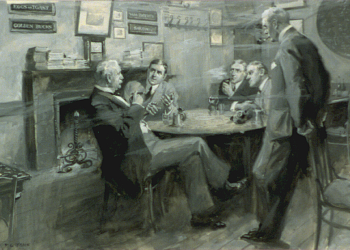My colleague Roger Schonfeld and I spend a great deal of time talking about lock-in: what it is, who is doing it, who is doing it well — and perhaps most curiously, why so many people and organizations seem to be unaware that they are in a marketing net until it is pulled tight. I recommend Roger’s Kitchen post on this topic, which you can find here; also look at Roger’s longer post on the Ithaka S+R site, which addresses some of the policy issues concerning workflow in the academy. Reading through the comments on Roger’s Kitchen post, though, leaves one with the impression that many people don’t know what lock-in is, confusing it with marketing, for example (it is a subset of, and in some instances an emergent property of, marketing), or not understanding that lock-in looks very different depending on whether you are the “lockor” or the “lockee.” Viewed at a high level, lock-in falls into three broad categories: Totalitarian, Authoritarian, and Democratic. It is the Democratic form of lock-in that is the most insidious.

Before going any further, I want to make the point, a point I make over and over until now even I am tired of hearing it, that this discussion has no moral dimension. There is no Manichean struggle in scholarly communications with Good fighting Evil, though to look at some library blogs or the effluvium from SPARC you would think that the devil had found a home on the boards of directors of the larger commercial firms. What we have instead is a suite of activities that are generated from the ground up, with each participant looking out for their own interests, as we would expect, and as we do ourselves in our personal dealings. The scholarly community has no unambiguous borders, despite cries to build a wall to keep out the commercial immigrants, and even capitalism itself. No one speaks for the community as a whole. Regarding lock-in, what we have is a situation where vendors want it and customers don’t. This is the natural order of things. Let the battle begin.
As for our taxonomy, what interests me is that people (mostly companies) that understand lock-in will often invoke one category in their defense of their own practices, which take place in another. Let’s work through the categories.
In the Totalitarian model of lock-in, every aspect of your activity is determined by a single vendor or institution. This may bring to mind an image of Stalin, but in fact you need look no further than the cheerful Apple icon on your phone or computer. I am drafting this post on a Mac laptop, glancing from time to time at my iPhone to keep an eye on the stable genius on Twitter, and last night I awoke to read on my iPad (Howard Zinn, People’s History of the United States). Apple does not play well with others. Some cables are proprietary, some services (e.g., iCloud) are available only to Apple users. If you want to pick and choose among services, Apple cannot be your preferred hardware company, as Apple tries to control every aspect of a user’s experience.
It’s worth remembering that the Totalitarian model was the norm in computing before personal computers came along. Software could only run on one brand of hardware; technologists were trained on equipment that came exclusively from IBM, DEC, Honeywell, and so forth, with very little communication among the manufacturers or the user base. There are no Totalitarian publishing companies (not that they don’t have aspirations), though there is some anxiety in the library world that the ILS could become a monolithic platform, tying libraries to a single vendor for a multitude of activities. (I may have something to say about ILS lock-in at a later time.)
In computing the Totalitarian model was replaced by the Authoritarian instance of Microsoft DOS, now Windows, which enabled anyone to write software for personal computers provided that it ran on the MS operating system. The Authoritarian model is very much alive in scholarly communications today and is the preferred method of lock-in among many in the not-for-profit sector. An example is PubMed Central, which abets cronies and bullies publishers, and the many universities that have passed mandates for their faculty to publish in open access (OA) venues. A smart authoritarian (like Microsoft) does not aspire to the Totalitarian, knowing that real value is generated by getting a multitude of people to work on your behalf. The largest publishers aspire to the Authoritarian; the Big Deal (how do you cancel it? How do you change the configuration of titles?) is an Authoritarian marketing technique, designed to make OA less disruptive and to gobble up market share. If the Big Deal were Totalitarian, the contract would be perpetual.
Democratic lock-in puts us squarely in the world of the economics of Brian Arthur, whom I have heard referred to as the “philosopher of the Internet.” In Arthur’s conception things outside of a particular product or service (network externalities) play a role in locking in users to particular venues. You are on Facebook because your friends are on Facebook. In this world the big get bigger — the Law of Increasing Returns. These economic principles explain why Internet use (and the money made from it) skews toward a small number of companies, why there is usually only one big dog in any product category.
Regarding lock-in, what we have is a situation where vendors want it and customers don’t. This is the natural order of things. Let the battle begin.
I had Democratic lock-in (by a different name) explained to me by an academic economist about 20 years ago. His illustration: Imagine that you move to a new town for a job. You know nobody there. One evening you decide to go out for a drink. At the main intersection in town, there is a bar on each corner. There is nothing that you can see that distinguishes one from the other. You randomly choose one, go inside, have a couple beers, watch the ball game, and chat with some of the bar flies. A week goes by and you decide to go out to a bar again. You go to the intersection, but which bar do you choose? Since you met some people, however casually, the first time you went out, you are likely to return to the first bar again. Week after week you repeat this, until you become a “regular.” Occasionally you try another bar, but you keep returning to the first, where, after all, most of your buddies are. And besides, your team won.
This kind of lock-in requires no proprietary technology; there are no bullies. But handcuffs are handcuffs, whether you can see them or not. Once a service begins to build network externalities, it grows and grows, faster and faster. Woe be it to the service that comes in as #2. On the Internet Avis would never have had the chance to challenge Hertz. This is what spawned the strategic dictum of Internet marketing: Get Big Fast.
We are now seeing a small number of major firms attempting to Get Big Fast in workflow tools and data analytics by introducing new products and acquiring companies. These firms defend their actions by saying that there is no lock-in, which is misleading. There is no Totalitarian lock-in, there may be no Authoritarian lock-in. But there is Democratic lock-in, where the independent choice of an individual leads inexorably to a stem-to-stern series of services, all provided by the same company. Bear this in mind the next time you go out for a drink. And let’s not forget another property of the Internet: the Winner Takes All business phenomenon. The Democratic lock-in strategy, paradoxically, leads to the hegemony of one company. Please nominate a candidate.
Whether this is good or bad depends entirely on where you sit. If you are a publisher or any other vendor, achieving lock-in is a highly desirable goal. It safeguards revenues, helps in introducing new products (or add-ons to the original product), and may improve margins. If you are a customer, it’s important to determine how much lock-in you can tolerate. Having zero lock-in is probably impossible (no one will sell you anything), but monolithic providers are not working in your interest and have found a way to circumvent the sharp costs of competition.
Discussion
6 Thoughts on "The Varieties of Lock-in in Scholarly Communications"
ONE MAN’S “PERSONAL DEALINGS” IS ANOTHER’S …
Hmm! So “What we have instead is a suite of activities that are generated from the ground up, with each participant looking out for their own interests, as we would expect, and as we do ourselves in our personal dealings.” The student ahead of me in this small university town has one hand on his cell phone and the other on his coffee cup. When the latter is finished, it is tossed aside. Adorned likewise, I hold my empty cup and dispose in the nearest recycling container. As for the democratic choice at the intersection, it is true that the first-choice principle was operative, but that first choice has to prove and sustain its metal. Publishers should know that we are an alert ‘electorate’ out here, quite aware of the possibility of greener grass at the other bar (and the joy of mixing metaphors)!
The statement “There is no Manichean struggle in scholarly communications with Good fighting Evil” is premised on the idea that “What we have instead is a suite of activities that are generated from the ground up, with each participant looking out for their own interests, as we would expect, and as we do ourselves in our personal dealings.” This premise is false. Not all participants look out for only their own interests, in scholarly communications or personal dealings. Many librarians and scholars are looking out for the interests of the public good, not their own personal gain. They are interested in getting information into the hands of those who can benefit from it, in order to promote education and the advancement of knowledge. If one deifies capitalism, one might not see this as Good, but if one doesn’t, then there is clearly a struggle in scholarly communications between altruism and those who look out for only themselves.
Thanks for using the Apple analogy. People rebel at corporations until they become addicted to one.
This seems to be a multi-dimensional issue. There is lock-in between supplier and customer in various shapes and guises (exclusive/non-exclusive; fixed for a term/at notice of either party; with/without support etc) but one also has to bear in mind the respective strength/power of either party. Elsevier, for example, looks to have considerable market power but if 200+ universities say “No/Nein” maybe not so powerful. Further, I suggest that one of the problems that libraries now face is that the traditional book-that-you-can-buy had effectively zero lock-in. The library bought it and could keep “it” for as long as it was needed, and if it was in danger of crumbling to dust, a copy could be made. Digital technologies and platform are different in that they do invite or allow for multiple forms of lock-in or digital decay. This is tricky for all parties.
I doubt that Mr. Esposito’s rhetorical style particularly helps him to make his case. (–Describing “effluvium” (OED meaning 2.c “In mod. popular use chiefly: a noxious or disgusting exhalation or odour.”) from SPARC, and conflating many librarians’ legitimate concerns regarding Elsevier’s strategy with every overwrought blog entry.) This post makes important points and then undermines itself with snark. The link “the devil has found a home” is self-serving and grandiloquent. Patronizing a significant portion of one’s readers is an unlikely means of persuasion. When Mr. Esposito proposes his taxonomy of lock-in he moves the discussion forward two steps; when he indulges in contrived pomposity he moves it a one step back.



